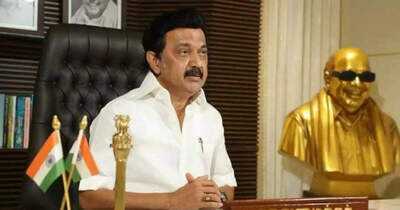
 Stalin's Strong Response to Keeladi Report Decision
Stalin's Strong Response to Keeladi Report Decision
The Chief Minister of Tamil Nadu, MK Stalin, expressed his discontent on Thursday regarding the Union government's choice to withhold the publication of the Keeladi excavation report, labeling it an attack on Tamil culture.
In a communication directed to the members of the Dravida Munnetra Kazhagam (DMK), Stalin emphasized that his party would persist in its efforts until the Centre acknowledges the historical significance and richness of Tamil civilization.
On May 23, the Archaeological Survey of India instructed archaeologist Amarnath Ramakrishna to revise his report on the Keeladi excavations, incorporating corrections recommended by two experts.
As reported on May 27, Ramakrishna declined to amend the report, standing firm on the integrity of his findings and the methods employed in documenting the archaeological site.
Stalin accused the BJP-led government of harboring animosity towards Tamils and their language, asserting that they are attempting to suppress the discoveries made at Keeladi.
He also took aim at the opposition party, the All India Anna Dravida Munnetra Kazhagam (AIADMK), for its silence on this matter, noting that the AIADMK is allied with the BJP in Tamil Nadu.
Stalin highlighted that the DMK administration has consistently championed the Tamil language and culture, even establishing a museum to showcase the excavation findings. In contrast, he claimed that the local BJP unit has forsaken its commitment to language and culture to please its higher-ups.
The Keeladi site has been a focal point of political discourse in recent years.
Ramakrishna, who oversaw two excavation phases at Keeladi from 2014 to 2016, discovered over 5,500 artifacts indicative of an urban civilization in Tamil Nadu during the Sangam period, which spans from the 3rd century BCE to the 3rd century CE in southern India.
In 2017, the Archaeological Survey of India reassigned Ramakrishna to Assam, a move that political factions deemed unusual at the time.
The findings from Keeladi garnered significant attention, and Ramakrishna's transfer was perceived as an effort to diminish the importance of the excavation.
The Archaeological Survey of India conducted a third excavation phase but announced in 2017 that no noteworthy discoveries had been made, leading to the cessation of the excavation.
This decision faced backlash from Tamil Nadu politicians, who accused the Union government of trying to conceal evidence of an ancient Tamil civilization.
However, the Madurai bench of the Madras High Court intervened, directing the Tamil Nadu State Department of Archaeology to take charge of the excavation, with the eleventh phase set to commence in June.
Since 2014, approximately 20,000 artifacts have been unearthed from Keeladi.
In a report submitted in 2023, Ramakrishna, now the director of antiquities, utilized accelerator mass spectrometry dating on 23 artifacts, revealing their origin around 300 CE.
This data allowed him to establish that the chronological range of the Keeladi site spans from the 8th century BC to the 3rd century CE.